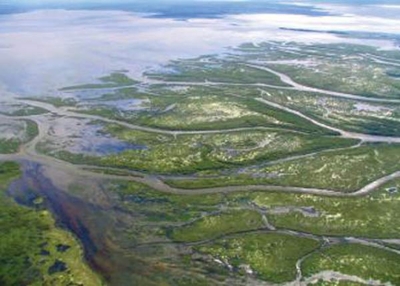
GIWS researchers investigate declining health of Saskatchewan River Delta
Delta Stewardship Symposium to showcase dialogue and scientific research that demonstrates the negative impacts in the Saskatchewan River Delta
The Saskatchewan River Delta is facing a serious decline in ecological health, according to researchers at the University of Saskatchewan (U of S), a condition that has dire implications for the residents of this biologically diverse area.
“The Saskatchewan River Delta is dying. We can’t stop it, but we can slow it down,” said Gary Carriere, Champion of the Saskatchewan River Delta Stewardship Committee and Councilor – Lands and Resources portfolio for Cumberland House, Saskatchewan’s oldest settlement.
The Saskatchewan River Delta, one of the country’s most important wetlands, receives flows that come all the way from the Rocky Mountains and provides a home for a vast number of plants, fishes, mammals and birds. However, community members have deep concerns over resource development upstream, including the operation of major dams.
“The Saskatchewan River delta ecosystem is declining because the flows are reversed from what used to make the delta ecosystem flourish - namely high spring flows slowly declining into the summer and very little flow in fall and winter,” said Graham Strickert, an Assistant Professor with the School of Environment and Sustainability and the Global Institute for Water Security at the U of S. These topics are to be discussed at the Delta Stewardship Symposium.
The event will also feature a symbolic ceremony where sediment from Lake Diefenbaker will be deposited into the Saskatchewan River Delta.
“This gesture hopefully will seed ideas,” said Strickert. “We want people to know that upstream developments influence water flows and fish, and also trap fertilizing sediment that is normally carried by rivers. The management of water resources is really a complex and multifaceted issue; we need to better understand the trade-offs between the social and economic benefits to the Province and the impacts on the downstream environment.”
Building on the work of partnerships such as the Delta Dialogue Network (DDN) and Delta Days, this event will showcase dialogue and scientific research that demonstrates the negative impacts of upstream development on ecosystem services in the Saskatchewan River Delta.
Along with U of S researchers, a number of speakers and stakeholders will be attending the event including Prince Albert Grand Chief Ron Michel.
The Delta Stewardship Symposium takes place on Thursday, July 28 from 10 am to 7 pm at Veterans Hall, Cumberland House.
